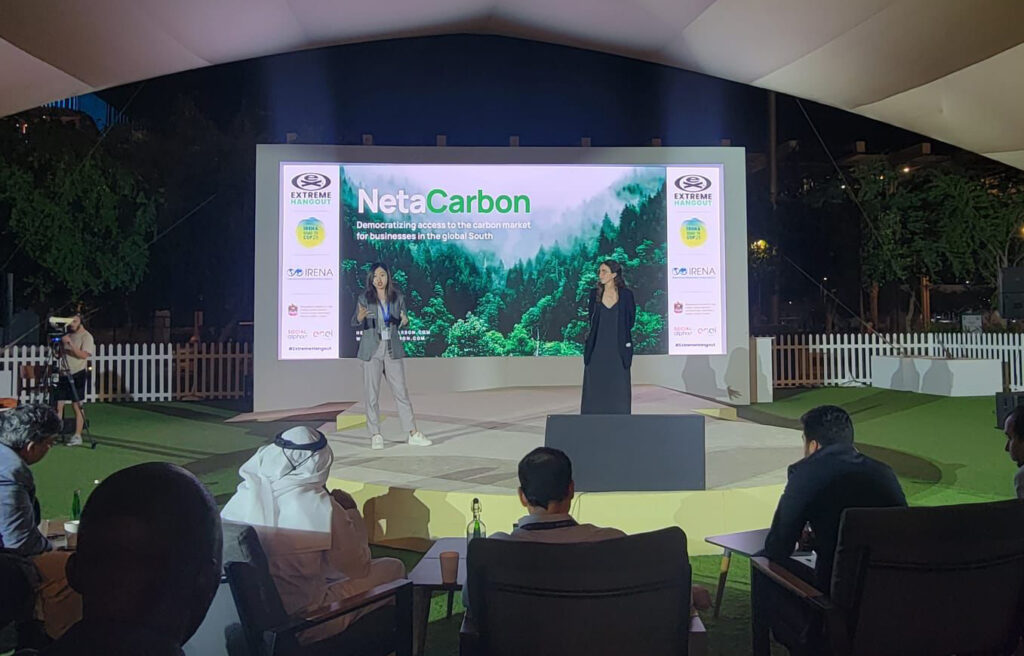Democratizing access to climate finance
The world is not short of brilliant ideas for cutting carbon emissions.
The problem is how to pay for them.
Globally, climate mitigation and adaptation are underfunded by $1.7 trillion per year, according to research backed by the United Nations. Government investments are nowhere near meeting the need, leading to hopes that the private sector can cover about 70 percent of climate financing globally.
To help bridge this gap, a startup incubated at the Harvard Innovation Labs wants to channel money into mitigation projects in developing countries – a solar farm that displaces a coal-fired power plant, electric transportation, afforestation. The source of the funding will be carbon offset credits, but without the years of paperwork or multiple layers of intermediaries who have, in some cases, earned a reputation for opacity and mismanagement.
NetaCarbon co-founder Grace Lam says the startup wants to democratize access to carbon offsets by simplifying and digitizing how credits are issued. After first assessing and ensuring the quality of a green project using established and transparent metrics, the platform connects the developer with buyers – firms that want to offset some of their emissions – and financial institutions to underwrite these projects. In exchange, says Lam, it will take a small fee.
“Carbon finance is the most straightforward way to create real actions on the ground in the Global South,” said Lam, a dual-degree student at Harvard Business School and Harvard Kennedy School, who likens the credits to green subsidies.

Take, for example, a business that wants to sell electric motorcycles to replace polluting two-stroke engines in Kenya. The business needs customers. The money used to purchase a carbon offset acts like a subsidy, helping the business lower its asking price for the electric motorcycles. That makes this clean technology more accessible to a wider group of buyers and, in the process, nudges along the clean transition.
NetaCarbon intends to lower the barrier to entry for green firms that want access to this source of finance.
“While we need innovations to reach net zero, we must also recognize that there are many proven technologies out there already, and the unresolved challenge is to scale and implement them,” said Lam.
Not every firm can completely decarbonize its supply chain – at least not in the foreseeable future. An offset, the theory goes, allows the dirtiest industries to meet net zero promises by paying others to lower their carbon emissions. Citi Group estimates the voluntary carbon market, worth $2 billion in 2022, could be valued up to $50 billion by 2030.
“If you don’t have the carbon market financing the current transition in the Global South, then where else is the money coming from?” says Lam, while acknowledging offsets need “a lot more scrutiny and transparency to call out bad behavior. There are people with bad intentions trying to take advantage. That’s for sure. But the offset industry also needs to do better in terms of promoting high-quality credits.”
Voluntary offset markets are regulated not by a state, but by non-governmental organizations that measure, report and verify (MRV) the claim behind each credit – how much carbon has been captured or removed or reduced from a specific activity. NetaCarbon will make this MRV data available to the public: “Anyone who wants to audit our data can see it and know that these projects are legitimate actions happening on the ground. Let’s get more data, more transparency,” Lam said. Addressing concerns that some offsets are sold to support projects that would have happened anyways (recent media attention has focused on a scandal involving a forest in Zimbabwe that was protected with offsets even though it may not have been threatened by logging), she stressed that the projects must “be additional to what is already being done.”
Typically, offsets are sold through consultancies that develop large projects and sell millions of dollars of credits – to protect that unthreatened Zimbabwe forest, for example. Such consultancies, often working with multiple layers of intermediaries all expecting a cut, take large fees.
According to Lam, NetaCarbon is designing a model that will leave more money in the hands of the hard-to-serve communities doing the green work on the ground.
“We are like TurboTax for carbon credits,” said Lam. “You could have an accountant help you with your taxes or you could use software like TurboTax that tells you what documents you need, how to fill them out, and how to file. There are variables that can be put into a formula to calculate how much credit a project can generate. It’s very complex, but not impossible to calculate, and certainly can be done much faster and easier with technology.”
Though they both live in Cambridge, Lam met her partner, Mar Velasco, a recent graduate of MIT Sloan School of Management, while they were both working on sustainability projects in Kenya.
With support from the Salata Institute for Climate and Sustainability at Harvard University, the two presented their project at COP28 in Dubai last autumn, where they met potential partners and started thinking more about “insetting” – helping larger firms develop their own carbon-negative projects. Unlike offsetting, where companies seeking to compensate for emissions purchase carbon credits from third parties, “insetting” helps a company reduce emissions or store carbon within its own value chain.
The task ahead is enormous, but Lam and Velasco are biding their time while bringing two pilot projects to market, cultivating buyers of high-quality credits, and growing a waitlist of green projects.
“We have started receiving lots of requests from companies that are like, ‘Hey, what you are doing is so cool because consultants have quoted me millions of dollars. I love that you guys are disrupting this space and I want to work with you to sell credits,’” Lam said. “But we want to do this right, centering quality and transparency in our work. First, we are proving that we can do this.”








